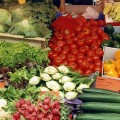Part 1
Courtney: Hi, Sandy, again thank you for participating in some interviews.
Sandy: No problem.
Courtney: I'd like to ask you about organic food, and what you think about organic food and its benefits to people's health and diets, and if you yourself are an organic food eater. Sandy: I actually feel really strongly about eating organic food, but it's really expensive, which is one drawback. I think it's really important to try to buy some things that you consume a lot, organically, if you can find somewhere to buy it that's not so expensive, because they say between seventy and ninety percent of food that you buy at the grocery store is covered in things that are really bad for you, including pesticides and chemicals. Courtney: Pesticides and chemicals? And they use this stuff during crop production?
Sandy: Some of them they use during crop production, and some of them they use on the actual seeds in the soil, to repel bugs right away from the soil. So the stuff is not only in the plants, but also the soil, and in the end it comes down in the rain as well.
Courtney: Right, okay, so these chemicals and pesticides have been used in the last-how long, about a hundred years? So that's the Green Revolution, this is a point in the Green Revolution-we're in the Green Revolution now-where these pesticides and insecticides and chemicals have been used to produce crops. But what about people's health? The health of people in general has improved, and the expected age of people has grown to quite a substantial number.
Sandy: But I think that has to do a lot with medical science, and medical advances, and technology. I don't think it has to do with the quality of food we're eating. Maybe it has to do with food, in that more food is accessible for everybody, but I don't think that the food that is being produced-at least in North America-is contributing to people's better health. Courtney: Okay. In terms of organic food, where do you buy organic food?
Sandy: You can buy organic produce at certain grocery stores. In Montreal, it's harder to find organic produce. There's lots of health food stores where you can buy organic oils, and, you know, pre-prepared food, but you can't find produce everywhere. A good idea, if you have a car, you can go out of the city and go to certain farms that are known to be organic.
Courtney: Right, and do you pick your food, your fruit and vegetables, at these farms?
Sandy: No, you can usually buy frozen bags or baskets of the food, and sometimes you can get it delivered, which is more expensive, but because you're buying bulk, it's probably about the same as what you'd spend at a grocery store. Courtney: Okay, interesting. I've also heard that in many other cities, and many other cultures, organic food is quite prominent in the food industry, and is eaten by many people. For example, on the western side of Canada and the United States-Vancouver, British Columbia, Oregon, California-organic food is very popular.
Sandy: Yeah, it's the norm almost. Courtney: Yeah, it's almost the norm, very popular. Sandy: In California, I think you can buy organic food just as easily, and for the same price, as regular groceries.
Courtney: Is that right?
Sandy: I think that's because more people there are concerned-the West Coast seems to be more enlightened in the health-in being concerned about health and environment. Courtney: What goes into the body.
Sandy: Yeah.
Courtney: I also know that the laws in California are quite strict with organic food production.
Sandy: The standard.
Courtney: The standard, which results in very nice, rich, organic food.
Sandy: Yeah.
Courtney: Whereas I have heard in other states and provinces, the rules are not very strong, and are often quite lenient. So there are times where you'll find something that is with an organic label on it, but it has been produced with- Sandy: An ingredient, or- Courtney: Some sort of an ingredient, another gene, or insecticide or pesticide, that's somehow indirectly associated with it. Sandy: Yeah, well, also you have to be careful about percentage, too, because I know that say they're organic, but if you look-if you read the label it will say "70% Organic," or even "50% Organic," which is better than, I guess, nothing at all, but it still probably has a lot of harmful chemicals in it.

